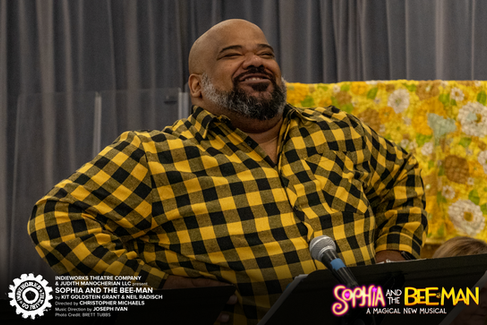Why Hiring the Right Director Can Make or Break Your New Show
- Christopher Michaels
- May 18, 2025
- 7 min read
Updated: Jun 3, 2025

You've poured your soul into this script. The characters speak in rhythms you've labored over for months, maybe years. The themes are rich, the arc is clean, and the world you've created is ready to take shape on its feet. But as a theatre writer or new producer developing a new play or musical, there's one decision that can make or break your entire trajectory: choosing the right director.
I don't say that lightly.
I've been in the rehearsal room where a show begins to fly! And I've also seen promising scripts buckle under the weight of mismatched vision, poor communication, or lack of development experience. The stakes are especially high with new theatrical works. Why? Because you're not just staging a script, you're discovering the show's identity in real time.
Your choice of director is not just important… It's pivotal.

The Right Director Knows How to Develop, Not Just Stage
There's a difference between directing a well-established play and helping to birth a brand-new one. With new work, I have to keep in mind that scripts are still in flux.
When I direct new work, I approach the process as a series of evolving drafts, just like a writer. My first read isn't about solving the play, it's about listening: to what's clear, what's hidden, and what the piece wants to become.
I listen-to the text, the writer, the actors, and even the silences in the room and then ask questions:
What's the story beneath the story?
Where does it sing (literally or metaphorically)?
What still needs to be clarified or cut?
Did that make us feel how we are supposed to feel?
Just as writers go through multiple drafts of a script, directors go through drafts of interpretation: of tone, of staging, of how a moment lands in a room. In early rehearsals, I treat staging, tone, and rhythm as experiments. I'll try something bold, then throw it out if it doesn't serve the story. I ask questions, test ideas, and shape the room so that writers, actors, and collaborators feel safe taking risks. For me, directing new work is about building a process where everyone is empowered to explore, adjust, and make the piece stronger together. Every decision is a proposal. Some will hold up. Others get rewritten. That's the work.
And that continues until you find something that feels right; something that sticks. It can be stressful and tedious and sometimes feel like you'll never get there. But when you do... Oh man! It's exciting! It's rewarding! It's worth it.

The Right Director Knows It’s About Vision, Not About Ego
Let's be honest: Some writers can become so close to the material that certain moments feel inevitable or untouchable, when in fact they may be confusing, redundant, or holding the piece back from its full potential.
And there are plenty of directors who, rather than serving the play, make the work overly focused on themselves or their vision, often at the expense of clarity, coherence, or the original intent of the piece.
Every director comes with a point of view (as they should). One of their most important responsibilities is to bring a clear, outside perspective to the piece, especially when the writer is deep inside the world they've created. But the best ones know when to lead and when to yield. (Full disclosure: I'm still working on this one myself.) Especially in developmental stages. You need someone who can "hold the container": a guide, a provocateur, a sounding board, and a problem solver; someone to challenge the writer to see their work through fresh eyes and ask better questions like, "What if this moment played differently?" or "What happens if we lose this and let the audience fill in the gap?"
I aim to offer a clear point of view while staying responsive to the writer's voice, the actors in the room, and what the material is teaching us in real time. And I often encourage writers to try the version that scares them a little, or the cut they were certain would never work, because often that experiment reveals the truth.
Remember, drafts aren't just for pages. The entire process is a series of evolving drafts, and the magic happens when everyone involved gives themselves permission to explore before locking anything in. I do my best to see what's on the page, but also sense what's between the lines and can bring that subtext to life through staging, tone, and tempo. Every director comes with a point of view, yes. But it's important to remember that it's in service of your story, not in competition with it.
The Right Director Creates a Room You Want to Be In
Let's talk about the room, shall we? (Ohhhhh the "room". The proverbial "room".)
Development can be thrilling! But it can also be vulnerable. A strong writer-director relationship is built on trust, active listening, and a shared commitment to elevating the piece. When that trust is present, the process becomes a creative conversation where new possibilities emerge from what's tried and even what fails. When there's trust and curiosity in the room, those failures become creative turning points. Not critiques, but invitations to grow the piece into what it truly wants to be. Actors feel safe to experiment, designers are invited into the storytelling early, and you, the writer or producer, feel respected and heard.
When you have the right director and that alchemy is right, something remarkable happens: discovery. It doesn't happen just sitting at the keyboard. Discovery happens in action! Suddenly, the script starts to breathe. Scenes reshape themselves. Songs reveal new meaning. Pacing sharpens. Moments land. And everyone in the room is a part of that evolution.
The Right Director Understands Both the Page and the Stage
This is especially crucial in musicals. it’s not enough to understand character arcs and dramatic structure (although that certainly helps!) The right director has to be able to think dramaturgically and visually, considering how the entire show flows as one cohesive, lived-in experience.
Every musical moment needs to be framed with intention: how is the audience arriving at this moment, and how are they being asked to receive it? That means thinking deeply about how design elements (light shifts, sound, scenic movement) support or contrast what’s happening emotionally. It also means being in conversation with choreography from the beginning, so that movement feels like an extension of character and not a break from it.
Transitions aren’t filler; they’re connective tissue that carry the emotional rhythm of the piece, and how we move from scene to song or from one emotional beat to the next can either heighten the storytelling or interrupt it.

Sometimes the most powerful moments in a musical aren't found in the big numbers, bold staging, or spectacular transitions, but in the quiet scenes in between: the stillness before the storm, the breath after a revelation. These moments require just as much, if not more, directorial precision and care. Without clear intention, quiet scenes can fade into the background or lose their emotional impact. The right director knows how to hold space for silence, how to shape pacing, tone, and tension so that even the subtlest beat lands with clarity and resonance. It's in these hushed, vulnerable moments where characters often reveal the most-and where audiences lean in and truly listen.
In a new work, especially, these layers aren’t “extras”, they’re the language of the piece, and it’s my job to make sure they’re all speaking fluently to each other. The right director gets both the mechanics and the music of your work and is, indeed, a rare and invaluable find.
The Right Director is In It for the Long Haul
"It's not a sprint, it's a marathon?" That's the saying, isn't it? Well, clichéd as it may be, I can't think of a better encapsulation of the truth in this context.
Developing a new play or musical isn't a one-weekend commitment. It can take years of readings, workshops, rewrites, and remounts before a piece reaches full production. The right director is someone who invests in the long game and understands process, not just product. I'm not just excited about your show's potential, I'm ready to go on the journey with you, draft after draft, step by step.
In early 2017, Kit Goldstein Grant sent me The Giant Hoax in response to my call for new works. She had already spent nearly a decade revising it, and over the next two years, through rewrites, workshops, and table reads, we shaped it into the version that premiered Off-Broadway at Theatre Row in 2019.
Our current project, Sophia and the Bee-Man (by Kit Goldstein Grant and Neil Radisch, produced by Judith Manocherian LLC and IndieWorks Theatre Company), began with a table read in 2021. Four years, multiple readings, and ongoing rewrites later, we're now preparing for the next phase of development and fundraising.
I won't pretend to know anything about running, but sure sounds like a marathon to me!
The Right Director Knows How To Wrap It Up (...kinda)
Whether you're a writer searching for your first collaborator or a producer assembling a creative team, know this: the director you choose will shape the future of your piece in profound ways. So take the time to find someone who gets your voice, challenges your assumptions, builds a room where your story can grow, and is willing to take the time to cultivate your relationship as well as your show. Because when the right director is in place, it's not just a production, it's a partnership. And that can make all the difference!
Let's Talk!
Are you developing a new play or musical? I'd love to hear about it! As a director passionate about new work, I'm always excited to meet writers and producers who are ready to bring their stories to life. Let's create something meaningful-together!
.png)











Comments